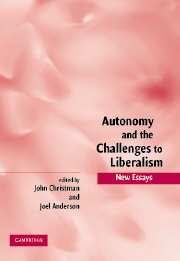Book contents
- Frontmatter
- Contents
- Contributors
- Preface
- Autonomy and the Challenges to Liberalism
- 1 Introduction
- PART I THE SELF: CONCEPTIONS OF THE AUTONOMOUS SELF
- PART II THE INTERPERSONAL: PERSONAL AUTHORITY AND INTERPERSONAL RECOGNITION
- 5 Taking Ownership: Authority and Voice in Autonomous Agency
- 6 Autonomy, Vulnerability, Recognition, and Justice
- 7 Autonomy and Male Dominance
- PART III THE SOCIAL: PUBLIC POLICY AND LIBERAL PRINCIPLES
- PART IV THE POLITICAL: LIBERALISM, LEGITIMACY, AND PUBLIC REASON
- Bibliography
- Index
5 - Taking Ownership: Authority and Voice in Autonomous Agency
Published online by Cambridge University Press: 02 December 2009
- Frontmatter
- Contents
- Contributors
- Preface
- Autonomy and the Challenges to Liberalism
- 1 Introduction
- PART I THE SELF: CONCEPTIONS OF THE AUTONOMOUS SELF
- PART II THE INTERPERSONAL: PERSONAL AUTHORITY AND INTERPERSONAL RECOGNITION
- 5 Taking Ownership: Authority and Voice in Autonomous Agency
- 6 Autonomy, Vulnerability, Recognition, and Justice
- 7 Autonomy and Male Dominance
- PART III THE SOCIAL: PUBLIC POLICY AND LIBERAL PRINCIPLES
- PART IV THE POLITICAL: LIBERALISM, LEGITIMACY, AND PUBLIC REASON
- Bibliography
- Index
Summary
How can any of my actions genuinely be my own? How can they be more than just intentional performances, with whatever investment of my will that involves, but also belong to me in the special way that makes me autonomous in performing them? How, in other words, can any of my actions be my own in such a way that they arise from or manifest my capacities for self-governance?
The literature on (locally) autonomous agency employs a number of metaphors to characterize the difference between merely intentional action and action that is, in the fullest sense, the agent's own. Harry Frankfurt's metaphors are among the most vivid and compelling. A person who acts autonomously genuinely “participates” in the operation of her will, as opposed to being “estranged” from herself or being “a helpless or passive bystander to the forces that move” her. Agents who act intentionally but without autonomy do not do what they “really want” to do; their effective volitions are “external to” or “outside” them. The pervasive notion in this literature that persons who are autonomous in acting act upon wills that are fully their own or that really belong to them suggests an initial answer to the questions with which the chapter opened. I am autonomous in acting just when I take ownership of my actions, or at least have the unimpeded capability to take ownership of what I do and regularly exercise that capability.
- Type
- Chapter
- Information
- Autonomy and the Challenges to LiberalismNew Essays, pp. 101 - 126Publisher: Cambridge University PressPrint publication year: 2005
- 28
- Cited by



